ABU DHABI, United Arab Emirates (AP) — The World Trade Organization will open its biennial meeting Monday in the United Arab Emirates as the bloc faces pressure from the United States and other nations ahead of a year of consequential elections around the globe.
The WTO’s 164 member nations will discuss a deal to ban subsidies that contribute to overfishing, extending a pause on taxes on digital media like movies and video games, and agricultural issues.
But headwinds remain for the organization and the world’s economy, particularly as the recovery from the coronavirus pandemic remains uneven across nations. Meanwhile, there are more than 50 elections affecting half the planet’s population planned for this year — perhaps none more critical for the WTO than the U.S. presidential election on Nov. 5.
Running again is former President Donald Trump, who threatened to withdraw the U.S. from the WTO and repeatedly levied tariffs — taxes on imported goods — on perceived friends and foes alike. A Trump win could again roil global trade.
WTO Director-General Ngozi Okonjo-Iweala, a dual Nigerian and American citizen, has pushed to insist the organization remains vital as 75% of the world’s trade is done on its terms.
“What we are focused on at the WTO are what are the appropriate reforms we need to do — no matter who comes into power, when,” Okonjo-Iweala earlier this month, insisting that the trade body remains relevant. ”If we get to what you’re saying — that the WTO becomes irrelevant — everyone, including you and me, will be in trouble.”
But even if President Joe Biden is re-elected, the U.S. has deep reservations over the WTO. The United States under the past three administrations has blocked appointments to its appeals court, and it’s no longer operating. Washington says the judges have overstepped their authority too often in ruling on cases.
The U.S. also has criticized China for still describing itself as a developing country as it did when it joined the WTO in 2001. Washington, Europe and others say that Beijing improperly hampers access to emerging industries and steals or pressures foreign companies to hand over technology. The U.S. also says China floods world markets with cheap steel, aluminum and other products.
Then there’s the voting format of the WTO itself. Major decisions require consensus. That means countries must actively vote in favor for proposals to take effect.

